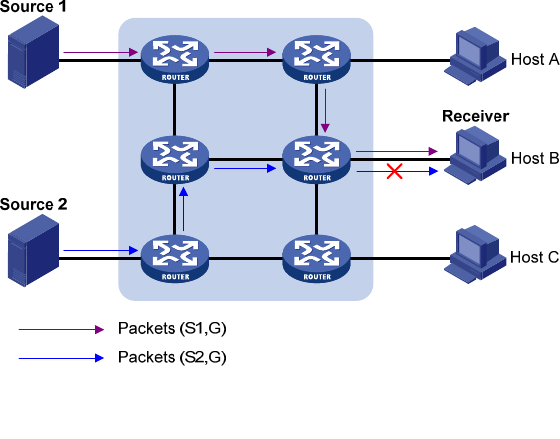HP VPN Firewall Appliances Appendix Protocol Reference
Table Of Contents
- Title Page
- Contents
- IP routing basics
- Static routing
- Default route
- RIP
- OSPF
- IS-IS
- BGP
- IPv6 static routing
- IPv6 default route
- RIPng
- OSPFv3
- IPv6 IS-IS
- IPv6 BGP
- Multicast overview
- Multicast routing and forwarding
- IGMP
- PIM
- MSDP
- IPv6 multicast routing and forwarding
- IPv6 PIM
- MLD
- Support and other resources
- Index

74
Enhancements in control capability of hosts
IGMPv3 introduced two source filtering modes (Include and Exclude). These modes allow a host to join
a designated multicast group and to choose whether to receive or reject multicast data from a designated
multicast source. When a host joins a multicast group, one of the following occurs:
• If it expects to receive multicast data from specific sources like S1, S2, …, it sends a report with the
Filter-Mode denoted as "Include Sources (S1, S2, …)."
• If it expects to reject multicast data from specific sources like S1, S2, …, it sends a report with the
Filter-Mode denoted as "Exclude Sources (S1, S2, …)."
As shown in Figure 49,
the network comprises two multicast sources, Source 1 (S1) and Source 2 (S2),
both of whic
h can send multicast data to multicast group G. Host B is interested in the multicast data that
Source 1 sends to G but not in the data from Source 2.
Figure 49 Flow paths of source-and-group-specific multicast traffic
In the case of IGMPv1 or IGMPv2, Host B cannot select multicast sources when it joins multicast group G.
Therefore, multicast streams from both Source 1 and Source 2 will flow to Host B whether or not it needs
them.
When IGMPv3 runs between the hosts and routers, Host B can explicitly express that it needs to receive
the multicast data that Source 1 sends to multicast group G (denoted as (S1, G)), rather than the multicast
data that Source 2 sends to multicast group G (denoted as (S2, G)). Only multicast data from Source 1
is delivered to Host B.
Enhancements in query and report capabilities
1. Query message carrying the source addresses:
IGMPv3 supports not only general queries (feature of IGMPv1) and group-specific queries (feature
of IGMPv2), but also group-and-source-specific queries.
{ A general query does not carry a group address or a source address.
{ A group-specific query carries a group address, but no source address.
{ A group-and-source-specific query carries a group address and one or more source addresses.
2. Reports containing multiple group records:










